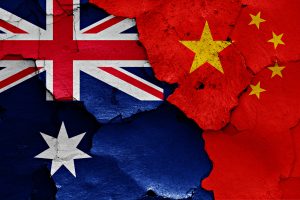The first visit by an Australian foreign minister to China in four years is raising hopes that Australia will make progress on ending trade sanctions and freeing two Australian citizens detained in China.
But Australia’s Foreign Minister Penny Wong cautioned on Tuesday before leaving that some of the thorny issues between the countries will take time to resolve. Still, diplomacy experts welcomed the visit as a positive move following years of frosty relations.
Wong will meet with her counterpart, Wang Yi, in Beijing this week as Australia and China mark 50 years of diplomatic relations. The visit will include a new round of talks on foreign and strategic issues after the talks were suspended in 2018.
“There has been a lot of speculation in the last 24 hours or more about what will happen,” Wong told reporters. “I will say this: the expectation should be that we will have a meeting, and that dialogue itself is essential to stabilizing the relationship. Many of the hard issues in the relationship will take time to resolve in our interests.”
She said she didn’t want to speculate on outcomes because it could have an impact on Australia’s leverage in the talks.
“In relation to consular cases, to save you asking the question, obviously I will be raising consular cases, as I always do, just as I will continue to advocate for the trade impediments to be lifted,” Wong said.
Australia has been pushing for the release of spy novelist Yang Hengjun, whom China accused of espionage, and journalist Cheng Lei, whom China accused of sharing state secrets.
China does not recognize dual citizenship and Chinese-born defendants such as Yang and Cheng are often not afforded the same treatment as other foreign nationals, particularly when facing espionage charges.
Wong’s trip signals a continued thaw in relations between the two nations since Australian Prime Minister Anthony Albanese won an election victory in May, replacing the more conservative Scott Morrison in the top role.
Albanese and Chinese President Xi Jinping met on the sidelines of the Group of 20 summit last month in Bali, the first such formal meeting between the leaders of the two nations in six years.
Chinese Foreign Ministry spokesperson Mao Ning said China hopes the visit will build on the momentum toward improved ties established at the Bali summit. China hopes the two countries will “push bilateral relations back to the right track and achieve sustainable development,” Mao said at a daily briefing this week.
Relations between Australia and China have been poor for several years after China imposed trade barriers and refused high-level exchanges in response to Australia enacting rules targeting foreign interference in its domestic politics and calling for an independent inquiry into the COVID-19 pandemic.
Jennifer Hsu, a research fellow at the Lowy Institute think tank, said the resumption of diplomatic dialogue was a welcome development. She said she could “see the wheels starting to move with regards to a number of issues pertaining to Australia and China.”
“It would be great if a breakthrough happens, but these things take time,” Hsu said.
She noted that China could reap some economic benefit from relaxing its trade sanctions on Australian goods.

































